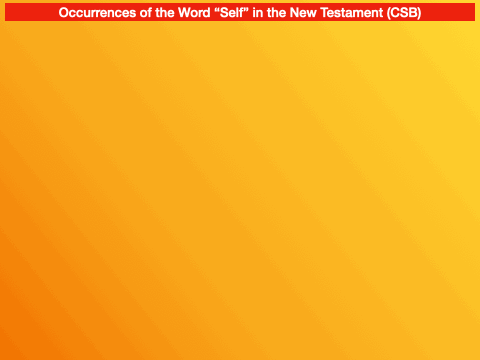|
|
Who Am I Bible Study
You may have noticed the logo at the top of every page of this website. We encourage people to discover who God wants them to be by studying the Bible. This Who Am I Bible Study is the resource for our readers to do exactly that.
It's a series of four weekly lessons. You can access the lessons at the bottom of this page. We pray they bless you and that they honor God Almighty.
Who Am I Bible Study - First Things First

Before we begin the Who Am I Bible Study series, we must first recognize that any world view of the nature of "self" is not the same as the biblical view of self.
For instance, a non-biblical world states that understanding oneself involves exploring one's thoughts, feelings, beliefs, values, motivations, and behaviors. It involves introspection, self-reflection, and self-awareness.
Some methods to help understand oneself include journaling, therapy, mindfulness practices, personality assessments, and seeking feedback from others. Additionally, experiences such as relationships, challenges, and personal growth can also provide insight into one's self.
Psychologists offer several different therapies to assist someone who wants to "know" or "understand" themselves better. This can involve an exploration of early childhood experiences or memories, or perhaps a development of a meaningful "connection with the universe."
Psychological approaches tend to seek the answers from within the patient. Ralph Waldo Emerson, the 19th-century American philosopher and writer, believed in the idea of self-reliance. And an American ideal is to rely on oneself, to be self-sufficient, and that successful people always do it themselves. But we hold that life is a team effort and that self-reliance, which is certainly commendable in many respects, will only get you so far.
But a biblical-based approach is entirely different and the opposite from the modern psychology method. It seeks the answers externally, or in other words - the patient does not have any answers in and of himself. One must turn to another source for the answer to the critical question of who he or she is.
We hold that the only source for who you are is the Holy Bible - that is God himself.
Not only do we know God by Jesus Christ alone, but we know ourselves only by Jesus Christ. We know life and death only through Jesus Christ. Apart from Jesus Christ, we do not know what is our life, nor our death, nor God, nor ourselves.
Blaise Pascal
Pascal, The Harvard Classics 48, 177
Well you may say, "Doesn't the Bible contain some psychology?"
And the answer can be yes, but it can also be no. But first, let's define psychology. The Oxford English Dictionary defines psychology as "the scientific study of the human mind and its functions, especially those affecting behaviour in a given context."1
You may know that the Bible provides plenty of insights and thoughts on the life of man. You might support the argument that there's a biblical psyschology. A study of the Bible finds that it addresses the nature of:
- the human soul (Genesis 2:7, Leviticus 24:17)
- spirit (Isaiah 29:24)
- body (Isaiah31:3)
- mind (Philippians 2:3)
- heart (Psalm 90:12)
- dysfunction (James 1:8)
- flourishing (Ephesians 3:16-19)
- the process of change (Romans 12:1-2)2
But then again, the answer is no - the Bible is not a psychology in the strictest sense of the definition. This is because the methodology of a biblical approach is not scientific per the above definition. All sources of reference are biblical or theological and not scientific. It's a theological approach.
A Biblical View of Self

The word "self" occurs in the Christian Standard Bible New Testament thirty two times as detailed below. Other versions may differ, but notice that there are ten different and distinct ways of defining one's self.
Also notice that half of them are negative. Four simply speak to an aspect of self. Finally, isn't it interesting that the term "self-control" appears in no less than half of the total.
32 Occurrences of the Word Self in the New Testament
A single time as:
- Very Self - Philemon 19
- Inner Self - Romans 7:22
- Self-Made Religion - Colossians 2:23
- Lovers of Self - II Timothy 3:2
- Self-Condemned - Titus 3:11
Twice as:
- New Self - Ephesians 4:24 and Colossians 3:10
- Self-Seeking - Romans 2:8 and I Corinthians 13:5
Three times as:
- Old Self - Romans 6:6, Ephesians 4:22, and Colossians 3:9
Four times as:
- Self-Indulgent - Matthew 23:25, Mark 7:22, I Timothy 5:6, and Colossians 2:23
Seventeen times as:
- Self-Control - Acts 24:25; I Corinthians 7:5, 7:9, and 9:25; Galatians 5:23; I Thessalonians 5:6 and 5:8; I Timothy 3:2 and 3:11; II Timothy 3:3 and 4:5; Titus 1:8, 2:2, 2:5, and 2:6; and twice in II Peter 1:6.

It certainly stands out that self-control is critical to the Christian walk which will be discussed later in this Bible study.
And obviously, the concept of self is broad; but remember, it has a universal application. In other words, everybody has a self. And everybody has a choice to define ourselves either from the world's point of view or from God's point of view.
Because Christians believe they are made by God, they cannot believe the world's view of themselves. They must believe the biblical view. One's true self can only be defined by one's maker, which leads us to an important question.
What Should The Christian's Attitude Toward Himself or Herself Be?

In his book, The Cross of Christ, John Stott asks the questions we seek to answer in this Bible study:
- Who are we?
- How should we think of ourselves?
- What attitude should we adopt toward ourselves?
He states "the cross revolutionizes our attitude towards ourselves and to God." He explains that the Christian community is one of self-understanding with a view towards self-giving. Therefore, Stott argues it's essential for the Christian to understand who they are.
Of course the Christian's identity is irrevocably tied to Jesus Christ. Christians are to consider themselves dead to sin (their old self) and alive to God in Christ Jesus (their new self) according to Romans 6:11. Stott argues that it's critical in the community of self-giving that Christians understand what it is they're able to give.
Regarding the questions above Stott offers, "The cross of Christ supplies the answer, for it calls us both to self-denial and to self-affirmation." These two seem to be at odds. But Christians require a double attitude, one attitude towards our old self, and another to our new self. Although our new self is redeemed, it's still fallen.
So then, two attitudes are required:
- self-denial of the old self
- self-affirmation of the new self3
Both attitudes are at war within us and cause us to fight daily to control ourselves. As Christians are fighting their old man or old woman daily, they are feeding their new man or new woman as well. This requires self-control. However, our self-control is often difficult but the good news is that we can be pure --> eternally pure!
Accordingly, this Who Am I Bible Study series consists of four lessons: Self-Denial, Self-Affirmation, Self-Control, and Pure Self.
Choose your lesson below.
Four Bible Study Lessons - Who Am I Bible Study
1 Soanes, Catherine & Angus Stevenson (eds.). 2004. Concise Oxford English Dictionary. Oxford: Oxford University Press.
2 Coe, John. 2007. Is Psychology Biblical?. Apologetics Study Bible. Nashville, TN: Holman Bible Publishers.
3 Stott, John R. W. 2006. The Cross of Christ. Downers Grove, IL: IVP Books.